Author: Release date:2017-05-09 09:52:59Source:发展研究院英文
The fifth Sino-German Leibniz Forum, co-sponsored by Fudan University and University of Hamburg, Germany, was held at Conference Room 103, East Wing, Guanghua Tower in Fudan University on 28 April, 2017. The Forum’s theme was “Germany in China: History and Memory.” Organized by the International Center for Studies of Chinese Civilization at Fudan University, the Forum invited experts and scholars specializing in such fields as Sino-German history, thought, philosophy, art and museology to discuss the opportunities and challenges facing China and Germany in the process of reviewing and reflecting their own history. The Forum aimed to jointly promote the sharing of the latest research findings in the academia of both countries.
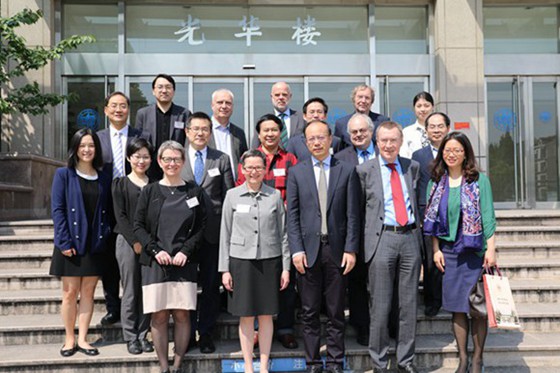
The opening ceremony of the Forum was hosted by Professor Jin Guangyao, Director of the International Center for Studies of Chinese Civilization at Fudan University. The opening remarks were made respectively by Professor Chen Zhimin, Associate Vice President of Fudan University and Dean of School of International Relations and Public Affairs at Fudan University, and Professor Susanne Rupp, Vice President of University of Hamburg. Professor Chen Zhimin pointed out that Germany assumes the serious responsibility of receiving refugees against the backdrop of European Integration; while China is undergoing a period of transition toward modernization. Reflecting upon the historical continuity would help us look to the future more wisely. Professor Rupp reviewed the long history of cooperation between Fudan University and University of Hamburg and the achievements of scholarly exchange and student education. She wished the success of the Forum.
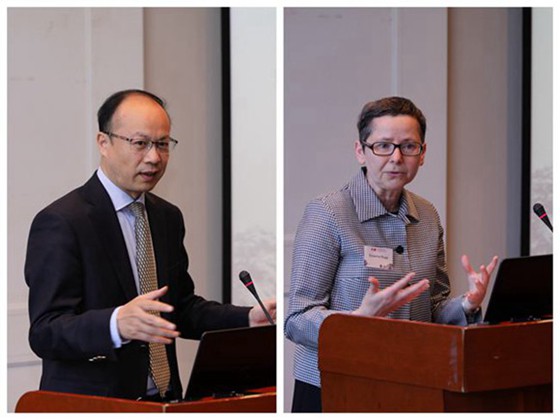
The Forum was divided into five sessions with more detailed agenda in the framework of “history and memory.” These sessions were respectively chaired by Professor Jin Guangyao from Department of History at Fudan University; Professor Michael Friedrich, Chair for Chinese language and literature at University of Hamburg; Axel Schildt, Professor of Modern History at University of Hamburg; and Li Tiangang, Professor of Religious Studies at Fudan University. Each session included a Chinese speaker and a German speaker, discussing refreshing topics on such themes as historical memory, image construction, cultural exchange and literary criticism.
In Session One, the Chinese speaker Professor Li Hongtu started from “memory” by proposing that, against the backdrop in which the history of memory represented by the French history study Realms of Memory is becoming a noted academic discipline, memory which is controlled, managed and dominated should be rediscovered, that collective memory be reconstructed, and that the history of nation states be rewritten. Correspondingly, the German speaker Professor Sabine Kienitz’s presentation revolved around “the politics of memory.” Starting from the memory of war in Germany after World War I and taking as an example the commemorative activities of cemeteries across Europe, she examined the ways in which the memory of war constantly developed with social development against the backdrop of sharing history globally and in which the memory of war eventually became part of the historical memory of every nation state.
In Session Two, starting from “the non-mainstream method of historiography,” Professor Fred Schrader from the Department of History at Fudan University contrasted the early society, the definition of which is relatively easy, and modern society in transition, the development of which is pushed forward by [forces] of forgetting and destroying. He explored the distinction and connection between “history” and “memory.” Meanwhile he pointed out that China and Europe are both undergoing cross-cultural transformation and that for this transformation in future it is critical to understand the relationship between culture and historical memory. By reviewing the sweeping of the Nazi remnants by Allies of World War II during the postwar period, the reconstruction of [social] order in the 1950s and 1960s and the reflections of history and pursuit of democracy by the young generation in Germany, Axel Schildt, Professor of Modern History at University of Hamburg, pointed out that the efforts of Germany to reflect the history of Nazi enabled us to see a positive future. After the War, Germany had experienced the development of democratization for several decades. After the German reunification, the democratic institution could effectively prevent the emergence of a political ideologysimilar to that of the Nazi.
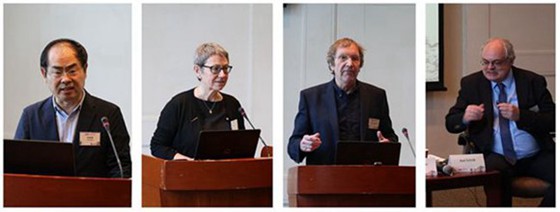
In Session Three in the afternoon, Olaf Mörke, Professor of Early Modern History at University of Kiel, retrospected the influence of the federalism on the Holy Roman Empire since the 14thCentury and later on the Netherlands, Germany and Switzerland, and affirmed its effect and historical significance on maintaining the order in political and public spheres and on maintaining the peace and stability of confederations during a certain historical period. Similarly, on the theme of “Conception and Reception: The Image of China in Europe and Germany,” Associate Professor Hu Chunchun from School of Foreign Languages of Tongji University analyzed several representative stages in the European perception of China during the past centuries and emphasized that the image of China was a constructed existence in Europe through the example of Michel Foucault’s The Order of Things which was written under the influence of the “China Encyclopedia” in novels by philosopher Jorge Luis Borges.
The subsequent Session Four focused on the cultural exchange between China and the West in modern history. Professor Michael Friedrich selected “Qian Zhongshu on Traditional Chinese Literature” as a specific case to explore the talent and scholarship of this master who has a thorough knowledge of Chinese and Western literary criticism as shown in the transcendence of the conflict between the East and the West in his critiques on traditional Chinese literature. He primarily discussed the form of writing in Limited Views and the gist (the demonstration of erudition, the path of comparative literature, the revelation of the universality of human aesthetic, etc) hidden underneath this form, and he guided us to further get to understand this master who had developed his own style by absorbing the merits of Chinese-style impressionistic criticism and Western-style citable criticism. By giving a presentation on “Chinese Students in Germany in the 1930s,” Professor Li Xuetao deeply analyzed the problems and challenges in the research of the history of [Chinese] overseas students, and put forward an idea of founding a research center for the study of knowledge transfer and the history of [Chinese] overseas students and of establishing a database on the network of historical figures.
In Session Five which was characterized by visual experience, the first speaker was Professor Jürgen Döring, Head of the Graphics and Poster Department at Hamburg Museum of Art and Trade. By presenting the images of political posters of various kinds since World War I, he showed to the audience a special sense of humor and artistry in various forms such as war posters, ideology posters, charitable posters and election posters. Through the design of artists and the focus of photographers, these posters all conveyed the epoch voice expressed “in between protest and propaganda.” Following the theme of visual propaganda, Professor Li Gongming from the Department of Art History at Guangzhou Academy of Fine Arts used “images as weapon” as the entry point and presented with great details a large number of political propaganda posters in various historical periods, showing aspects of military education, revolutionary propaganda, and class criticism in the historical development of political propaganda posters since the founding of People’s Republic of China. Finally he expressed his concerns for putting into practice the realistic responsibility and for fulfilling social responsibility through propaganda posters.
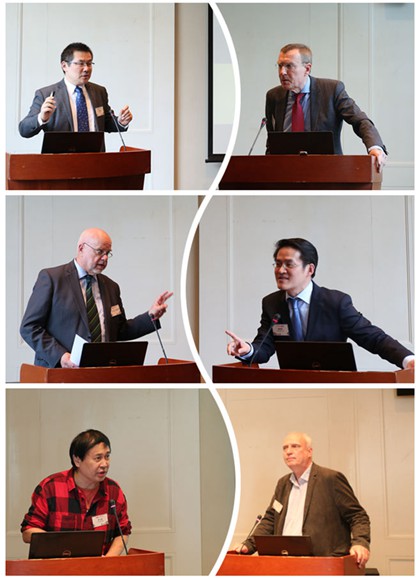
The heated discussion by scholars in the Forum attracted the attention of interested teachers, students, journalists and other audiences. After each presentation, audiences positively interacted with speakers by raising questions and expressing concerns and they were actively involved in the exchange of opinions with foreign scholars. It demonstrated the importance of the agenda of this forum, and showed that The Fifth Sino-German Leibniz Forum had provided a good platform for scholars of China and Germany and the public to understand each other.
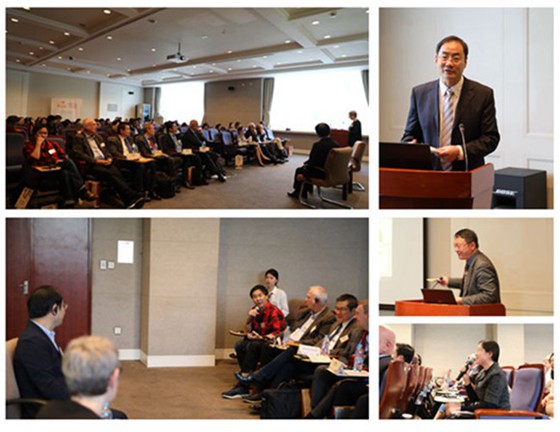
The organization of the Forum facilitated Fudan University and University of Hamburg to utilize their best resources in human and social sciences, and consolidated mutual cooperation. Since the launch of the Sino-German Leibniz Forum in 2013, the Forum has been held biannually, in Shanghai and Hamburg respectively. The Forum will be held again in University of Hamburg this October.
Source:The Fifth Sino-German Leibniz Forum Concluded Successfully